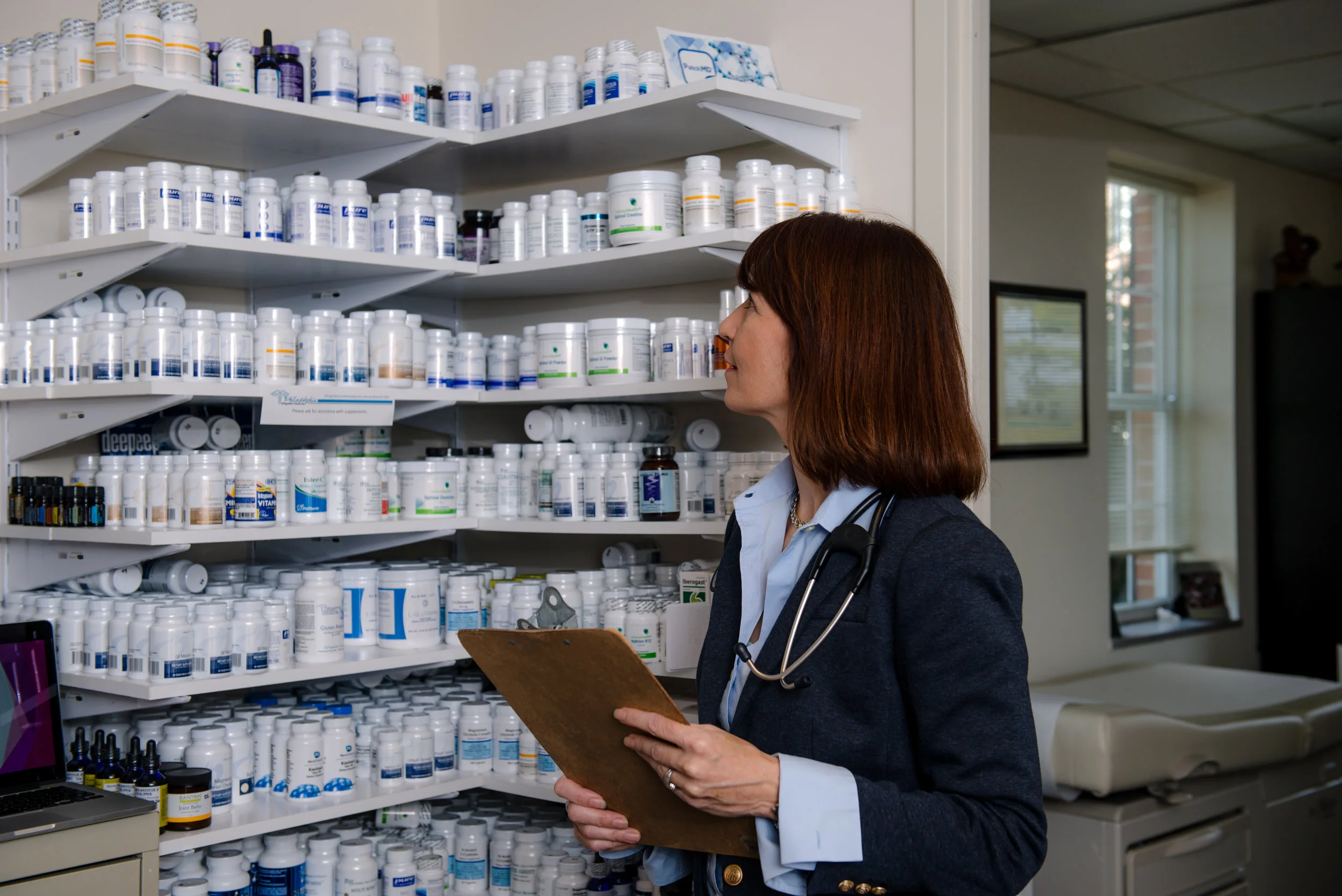Selecting a Probiotic: How Do I Choose?
By Georgia Tetlow, MD and Jill Maddock, PIM Office Manager
With all of the products on the market today, it can become overwhelming to choose the probiotic which is right for you. Probiotics contain living microorganisms that can improve the balance of bacteria and all microbes in our gut, for in fact we have beneficial yeasts, viruses, and even beneficial parasites inside our intestines. We’re focusing on bacteria--and there are over 100 trillion bacteria inside us--many more beneficial bacteria than overall cells in our bodies! Many of you know that approximately 80% of the immune system in located within our gut, but did you know these beneficial bacteria weigh 3-5 pounds? This beneficial bacterial community helps keep harmful types of microbes from overpopulating us; they also stimulate our immune system, facilitate digestion, assist with vitamin and nutrient absorption, and regulate our gene expression, including helping to prevent colon cancer. If the balance is off, we also lose out on the nourishing effects of the excretion products of these beneficial bacteria. Our microbiome helps us in so many ways.
Ask yourself - how often do you experience stress, inflammation, surgery, poor nutrition, or a round of antibiotics? Is it possible you may have recently affected or even harmed some of the helpful bacteria in your gut? Unfortunately, some of us of have differing degrees of bowel dysbiosis (microbial imbalance) that can manifest as headaches, fatigue, mood alterations, allergies, skin rashes, constipation, leaky gut, etc. The good news is that some probiotics have potential to improve our overall health and help us function better and feel better! Join us on 11/28 for a free talk on Gut Health!
Every bacteria, and probiotic, has three names--a genus, species and strain--listed in that order. For example, Lactobacillus rhamnosus GG.
Lactobacillus is the genus
rhamnosus is the species
GG is the strain
Lactobacillus can be abbreviated with an “L”. Bifidobacterium is another genus, and is abbreviated with a “B”, for example B. brevis. In the small intestine, Lactobacilli are prevalent and both Lactobacillus and Bifidobacteria are present in the large intestine. If you take antibiotics, it’s important to re-inoculate your gut with a probiotic containing both of these types of bacteria. This can get even more complicated if you take a particular type of antibiotic, called clindamycin, then it’s important to re-inoculate your gut with a beneficial yeast probiotic called Saccharomyces Boulardii, to help prevent C. Diff infection (the genus and species are Clostridium difficile).
How to Choose a Brand
When choosing a probiotic, “Enterococcus faecium” should be avoided, as it had been known to cause infections. Probiotics often contain helpful prebiotics to help feed the probiotic itself, but if you have yeast overgrowth (many of us do, because of our sugar-rich standard American diet), then it’s best to not overdo probiotics as they equally support bacteria and yeast in the intestine. It is recommended to take a mixture of several strains rather than one--unless you are taking a specific strain for a specific purpose. Efficacy depends on many factors, including the number of live colonies contained in the product. Unfortunately, pasteurization and how probiotics are transported and stored can reduce the actual number of live bacteria in each capsule so choosing more hardy strains of bacteria are usually preferred.
At Philadelphia Integrative Medicine, we take extensive courses to learn and stay up to date as to which probiotics are most helpful for our patients. In our clinic we often utilize Biodoph-7 Plus and Saccharomyces Boulardii by Biotics and Probiophage by Designs for Health, depending on your condition. If you can’t make it into our office, that’s okay you can purchase all of these through our online dispensary!
Dosing
1-10 billion colony forming units (CFU) is generally a good daily dose. For those with conditions such as IBS, Crohn's or other infections it is important to work with a provider to choose the correct probiotic, to take it at the right time (with food or away from certain medications), at the correct dosage. Request an appointment or free consultation to start feeling better today! Probiotics can be very beneficial to children and there are many products tailored to the proper dosage. In patients with a pre-existing gut condition, it may be recommended to take a probiotic daily for longer periods. Our experience is that less than 5-10% of patients experience occasional gas after beginning probiotics and this can be a normal part of rebalancing your system.
Do I take probiotics with or without food?
Take them with food! They need to eat, just like us!
Foods can also be a great source of prebiotics and probiotics, check back for next week’s post for more advice!
Note: you may want to avoid probiotics if you are immuno-compromised; always discuss the use of probiotics with a provider who is trained in their use.
Interested in connecting with PIM? Register for our upcoming group class at Cabrini College: November 28th - Your Gut Health: Healing Leaky Gut and SIBO with Lauren Houser, CRNP. Admission is FREE!
If you or your loved one has ongoing stress, mood or hormone imbalance, or they are suffering from a chronic illness, please consider scheduling a 20 minute free consultation or an appointment with Lauren Houser, MS, MSN, CRNP or Annmarie McManus, MMSc, PA-C, PT, IFMCP.

